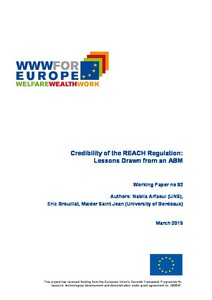Credibility of the REACH regulation: lessons drawn from an ABM
"The present paper takes ground on an agent-based model presented in Arfaoui et al. (2014) to investigate the effects of credibility upon technology substitution such as stimulated by the REACH regulation (EC 1907/2006). The model is used to study how the perceived credibility by clients on the...
| Main Authors: | , , , |
|---|---|
| Institution: | ETUI-European Trade Union Institute |
| Format: | TEXT |
| Language: | English |
| Published: |
Vienna
2015
WWWforEurope |
| Subjects: | |
| Online Access: | https://www.labourline.org/KENTIKA-19113323124919315059-Credibility-of-the-ReaCH-regul.htm |
| _version_ | 1771659899066908673 |
|---|---|
| author | WWWforEurope Arfaoui, Nabila Brouillat, Eric Saint Jean, Maïder |
| author_facet | WWWforEurope Arfaoui, Nabila Brouillat, Eric Saint Jean, Maïder |
| collection | Library items |
| description | "The present paper takes ground on an agent-based model presented in Arfaoui et al. (2014) to investigate the effects of credibility upon technology substitution such as stimulated by the REACH regulation (EC 1907/2006). The model is used to study how the perceived credibility by clients on the one hand and the perceived credibility by suppliers on the other hand influence or nor the transition from an old established technology to a new safer technology in two opposite scenarios: when the scenario is highly stringent (HS) or weakly stringent (LS) in terms of target-performance and timing. Results show that enhancing client credibility favors technology substitution by accelerating the diffusion of the new environmental technology and benefits the environment. However higher client credibility in the LS has counterproductive effects since suppliers have to face a strong pressure by clients to adopt the new technology but it is not accompanied by a forceful discrimination by public authority. When considering supplier credibility, there is no significant influence except that higher supplier credibility in the LS means stronger pressure to adopt early T2 and to get a mixed portfolio but it turns to be premature since the demand is not ready to buy such a technology. The last section of the paper provides a discussion of these results." |
| format | TEXT |
| geographic | EU countries |
| id | 19113323124919315059_b42688bdf9d14f4d981ad9c18e50bb88 |
| institution | ETUI-European Trade Union Institute |
| is_hierarchy_id | 19113323124919315059_b42688bdf9d14f4d981ad9c18e50bb88 |
| is_hierarchy_title | Credibility of the REACH regulation: lessons drawn from an ABM |
| language | English |
| physical | 35 p. Digital |
| publishDate | 2015 |
| publisher | Vienna WWWforEurope |
| spellingShingle | WWWforEurope Arfaoui, Nabila Brouillat, Eric Saint Jean, Maïder chemical industry chemicals industrial policy innovation REACH Regulation Credibility of the REACH regulation: lessons drawn from an ABM |
| thumbnail | https://www.labourline.org/Image_prev.jpg?Archive=108197992637 |
| title | Credibility of the REACH regulation: lessons drawn from an ABM |
| topic | chemical industry chemicals industrial policy innovation REACH Regulation |
| url | https://www.labourline.org/KENTIKA-19113323124919315059-Credibility-of-the-ReaCH-regul.htm |

